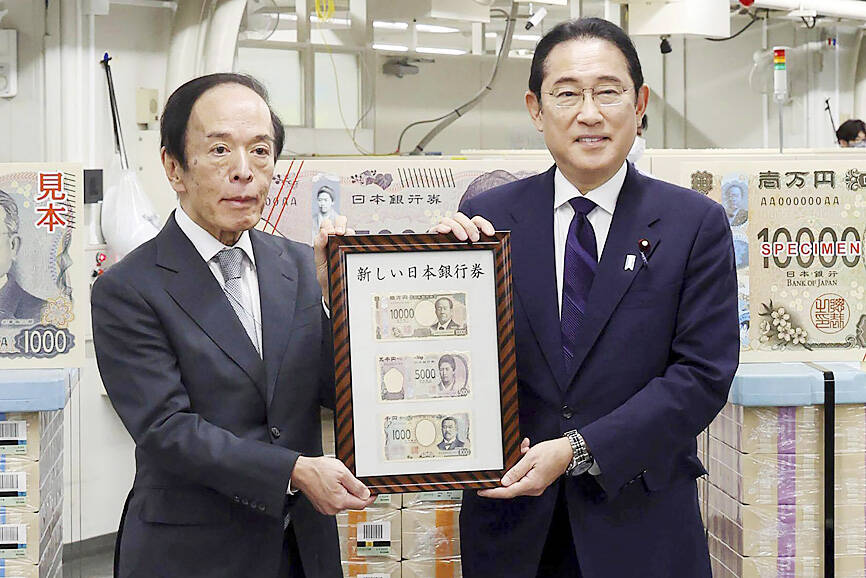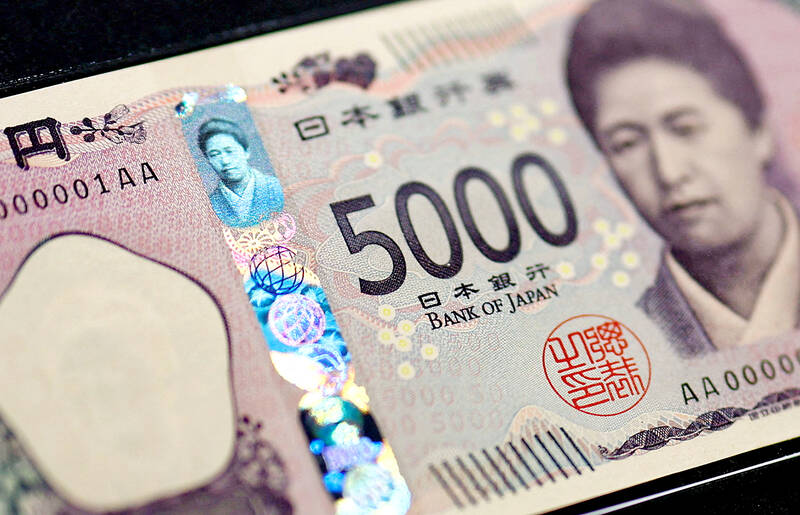Japan yesterday began circulating its first new banknotes in 20 years, featuring 3D portraits of the founders of financial and female education institutions in an attempt to frustrate counterfeiters.
The notes use printed patterns to generate holograms of the portraits facing different directions, depending on the angle of view, employing a technology that Japan’s National Printing Bureau says is the world’s first for paper money.
“Faces of those representing Japan’s capitalism, women’s empowerment and technology innovation are on the new bills,” Japanese Prime Minister Fumio Kishida said at a function.

Photo: AP
The step comes just as the economy moves into a growth-driven phase for the first time in three decades, Kishida said.
Existing bills will stay in use, but train stations, parking lots and ramen shops are scrambling to upgrade payment machines as the government pushes consumers and businesses to use less cash in its bid to digitize the economy.
The new ¥10,000 (US$62) note depicts Eiichi Shibusawa (1840-1931), the founder of the first bank and stock exchange, who is often called “the father of Japanese capitalism.”

Photo: REUTERS
The new ¥5,000 bill portrays educator Umeko Tsuda (1864-1929), who founded one of the first women’s universities in Japan, while the ¥1,000 bill features a pioneering medical scientist, Shibasaburo Kitasato (1853-1931).
While Kishida talked up the latest technology to fight counterfeiting, it is not a major problem in Japan. The 681 fake banknotes police detected last year represented a sharp drop from a record high of 25,858 in 2004.
Authorities plan to print about 7.5 billion newly designed bills by the end of this fiscal year, swelling the 18.5 billion banknotes, worth ¥125 trillion, in circulation by December last year.
“Cash is a secure means of payment that can be used by anyone, anywhere and at any time, and it will continue to play a significant role” despite alternatives, Bank of Japan Governor Kazuo Ueda said.
The central bank has experimented with digital currencies, but the government has made no decision whether to issue a digital yen.
Cashless payments in Japan have almost tripled over the past decade to account for 39 percent of consumer spending last year, but still lag global peers and should rise to 80 percent to boost productivity, the government has said.
Nearly 90 percent of bank ATMs, train ticket machines and retail cash registers are ready for the new bills, but only half of restaurant and parking ticket machines, the Japan Vending Machine Manufacturers’ Association said.
Almost 80 percent of the nation’s 2.2 million drink vending machines also need upgrades, the association said.

Mercuries Life Insurance Co (三商美邦人壽) shares surged to a seven-month high this week after local media reported that E.Sun Financial Holding Co (玉山金控) had outbid CTBC Financial Holding Co (中信金控) in the financially strained insurer’s ongoing sale process. Shares of the mid-sized life insurer climbed 5.8 percent this week to NT$6.72, extending a nearly 18 percent rally over the past month, as investors bet on the likelihood of an impending takeover. The final round of bidding closed on Thursday, marking a critical step in the 32-year-old insurer’s search for a buyer after years of struggling to meet capital adequacy requirements. Local media reports

US sports leagues rushed to get in on the multi-billion US dollar bonanza of legalized betting, but the arrest of an National Basketball Association (NBA) coach and player in two sprawling US federal investigations show the potential cost of partnering with the gambling industry. Portland Trail Blazers coach Chauncey Billups, a former Detroit Pistons star and an NBA Hall of Famer, was arrested for his alleged role in rigged illegal poker games that prosecutors say were tied to Mafia crime families. Miami Heat guard Terry Rozier was charged with manipulating his play for the benefit of bettors and former NBA player and

The DBS Foundation yesterday announced the launch of two flagship programs, “Silver Motion” and “Happier Caregiver, Healthier Seniors,” in partnership with CCILU Ltd, Hondao Senior Citizens’ Welfare Foundation and the Garden of Hope Foundation to help Taiwan face the challenges of a rapidly aging population. The foundation said it would invest S$4.91 million (US$3.8 million) over three years to foster inclusion and resilience in an aging society. “Aging may bring challenges, but it also brings opportunities. With many Asian markets rapidly becoming super-aged, the DBS Foundation is working with a regional ecosystem of like-minded partners across the private, public and people sectors

BREAKTHROUGH TECH: Powertech expects its fan-out PLP system to become mainstream, saying it can offer three-times greater production throughput Chip packaging service provider Powertech Technology Inc (力成科技) plans to more than double its capital expenditures next year to more than NT$40 billion (US$1.31 billion) as demand for its new panel-level packaging (PLP) technology, primarily used in chips for artificial intelligence (AI) applications, has greatly exceeded what it can supply. A significant portion of the budget, about US$1 billion, would be earmarked for fan-out PLP technology, Powertech told investors yesterday. Its heavy investment in fan-out PLP technology over the past 10 years is expected to bear fruit in 2027 after the technology enters volume production, it said, adding that the tech would